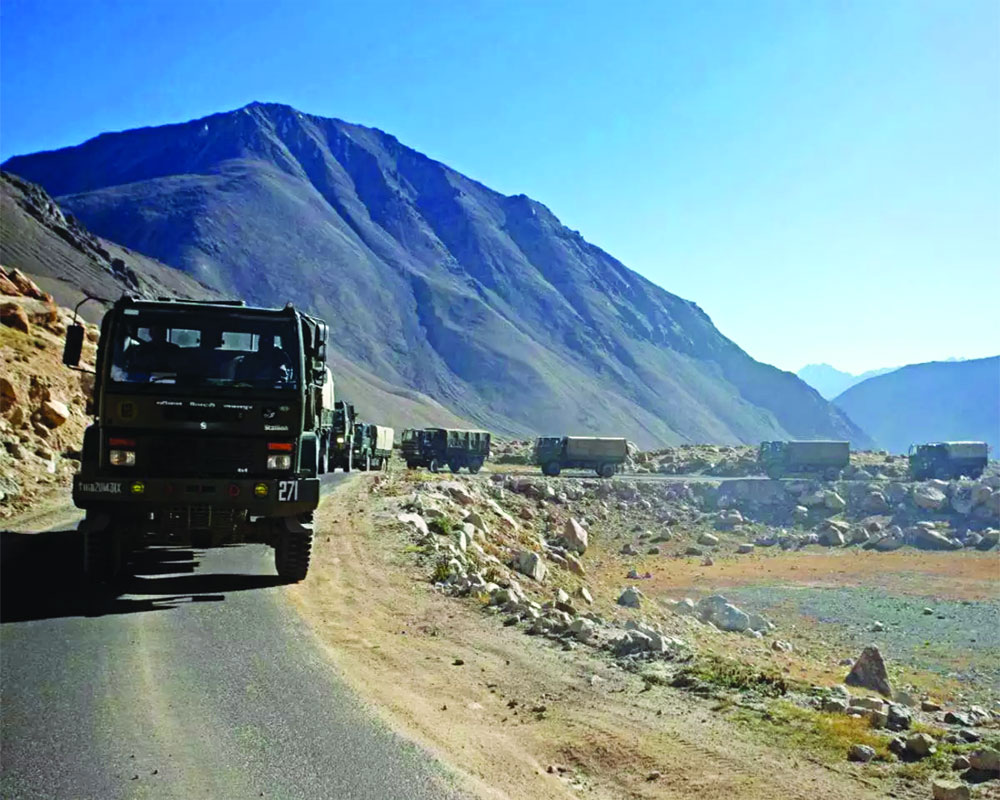China managed to get the strategic Chushul heights vacated on the cheap but India is portraying the partial disengagement as victory
With five State elections planned over the next few months by accident or design, India might have hit a strategic sweet spot: Defusing its two-front standoff against China and Pakistan. With a partial and selective disengagement secured on China’s terms, India is portraying this as victory in sync with its policy of “resolute response” to force the Chinese withdrawal from heights astride the Pangong Tso, leaving other People’s Liberation Army (PLA) intrusions from Depsang to Demchok intact. Last Thursday MEA spokesperson Anurag Shrivastava, sounding abundant caution, said it was India’s expectation that China will work with it to complete disengagement in the remaining areas which will lead to de-escalation in East Ladakh. That alone will lead to peace and provide conditions for progress in bilateral relations. Last Sunday, Chinese Foreign Minister Wang Yi was singing an old tune on the rights and wrongs of the standoff, blaming India and reiterating that neither country was a threat to the other.
After the standoff, China has adopted a substantially different position by not placing the border dispute as central to bilateral relations. On February 25, Wang informed Foreign Minister S Jaishankar of “some wavering and back-pedalling” affecting “practical cooperation between the countries”. This is reason enough to delay future meetings to defuse other friction points. It is fair to assume that for China, the disengagement process is over with Beijing managing to get the strategic Chushul heights vacated on the cheap. The reference to “difficulty in practical cooperation” will make future military and civilian dialogue on restoration of status quo ante April 2020 highly unlikely — certainly not before July 1, the Chinese Communist Party’s centenary conclave. India’s readiness to make concessions to China comes straight out of Jaishankar’s book ‘The India Way: Strategies For An Uncertain World’.
No one knows the numbers involved but approximately 2,000-3,000 troops (a brigade) from each side have pulled back, not pulled out. Both sides have 50,000-70,000 soldiers posted on the front lines. The additional deployments and capital costs as well as maintenance and logistics put together for one year are estimated to be nearly Rs 30,000 crore (Rs 21,000 crore in capital expenditure alone). Then there is the cost of re-posturing troops from Pakistan to China’s front which is work in progress. This level of additional expenditure has never been incurred on the Line of Actual Control (LAC) and the revenue cost will further undercut modernisation. China’s defence budget has crossed $200 b, roughly four times India’s. Its internal security bill is even higher as it is the main driver of internal cohesion. The India-China capability gap can be measured from the investment differential and willingness on the part of China to use the power quotient for coercion on the LAC.
Indian Generals’ prominent reference to Chinese disengagement from the lakes as “loss of faith” was seen as insulting (and beginning of practical difficulties). The PLA’s withdrawal from the Fingers area was traded for vacation of the strategic Chushul heights they had occupied for the first time since 1962. Yielding the key bargaining chip for an immediate political imperative — provincial elections — may prove costly. But this give-and-take was necessary for the Narendra Modi Government to depict the disengagement as victory against China. The Government has utilised the military’s strategic prowess — Uri (2016), Doklam (2017), Balakot (2019) and now Ladakh (2021) — as political success stories against China and Pakistan.
The backchannel talks with Pakistan’s NSA Moef Yusuf, which India has denied, took place after the Galwan clash because the two-front situation began to hot up. It was a wise move, coming as it did after Indian security planners decided to switch four divisions facing Pakistan towards the North. The ceasefire could lead to a new India-Pakistan normal. Suddenly, pieces of the two-front puzzle are seen coming together despite the absence of a national security strategy. That says something.
New Delhi is on the threshold of major defence reforms: ‘The India Way without an Integrated Review’ or ‘Strategic Defence and Security Review’. Military commanders in charge of these reforms must not trivialise the process by allowing symbolism and politicisation to creep in to please the political elite. Last week the tri-service commanders were lined up in Gujarat for their review meeting in front of the towering statue of “Iron Man Sardar Patel”, when that photo-op should have been with the images of military icons like Field Marshal Sam Manekshaw and Air Chief Marshal Arjan Singh, because the PMO wanted it. Regrettably, military ethos and traditions are alien to most Indian politicians and civil servants.
But the partial disengagement deal, achieved by the Foreign Ministers under conditions of power asymmetry, reflects India’s willingness to accept that the “price of a pragmatic settlement (with China) will be less than the cost of a difficult relationship”.
(The writer, a retired Major General, was Commander, IPKF South, Sri Lanka, and founder member of the Defence Planning Staff, currently the Integrated Defence Staff. The views expressed are personal.)
























